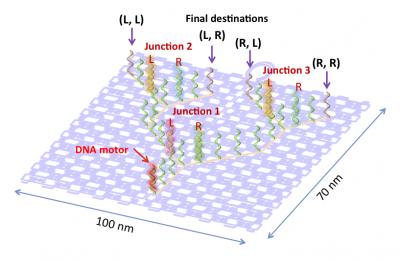Scientists at the University of Oxford and Kyoto University have created a motor that can navigate a programmable network of tracks and switches using DNA building blocks, paving the way to further advancements in the nanoengineering field.
 A depiction of a DNA origami tile with a built-in network of tracks. The DNA engine or motor, in red, can be programmed to navigate a series of junctions to reach one of four desired end points. (Credit: Sugiyama Lab, Kyoto University iCeMS)
A depiction of a DNA origami tile with a built-in network of tracks. The DNA engine or motor, in red, can be programmed to navigate a series of junctions to reach one of four desired end points. (Credit: Sugiyama Lab, Kyoto University iCeMS)
The researchers have reported their findings in an article titled ‘A DNA-based molecular motor that can navigate a network of tracks’ in the Nature Nanotechnology journal. The study uses the DNA origami technology, where DNA molecule strands are arranged in a manner that will make them to assemble by themselves into desired two-dimensional and three-dimensional structures. In this research, the scientists developed a network of tracks with several switches over DNA origami tiles, thus making the motor molecules to move along these rail systems.
One of the researchers, Dr. Masayuki Endo from the Institute for Integrated Cell-Material Sciences (iCeMS) of the Kyoto University stated that the research team has showed that in addition to developing autonomously operating nanoscale devices, it is possible to make such devices to generate predictable outputs using various controllable starting conditions. Dr. Shelley Wickham from the University of Oxford believes that the research has paved the way to develop highly complicated systems such as advanced sensors and programmable molecular assembly systems.
According to Professor Hiroshi Sugiyama from iCeMS, the work is still in its premature stage in developing DNA origami-based engineering systems, as several technical barriers have to be overpowered so as to enhance the output quality.